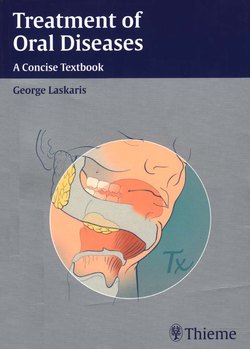Читать книгу Treatment of Oral Diseases - George Laskaris - Страница 26
На сайте Литреса книга снята с продажи.
ОглавлениеBuccal Cellulitis
Definition
Cellulitis is a relatively common infectious process of the dermis and subcutaneous tissues.
Etiology
Staphylococcus aureus and S. pyogenes are the most common causative organisms. Cellulitis in children can also be caused by group A streptococci and Haemophilus influenzae.
Main Clinical Features
•Systemic symptoms such as fever, chills, and malaise
•Diffuse, painful, firm, ill defined erythematous swelling that feels warm
•Vesicles, bullae, pustules, and tissue necrosis may occur in cases of severe infection
•Regional lymph node enlargement may occur
Diagnosis
The diagnosis is usually based on the clinical criteria. Blood culture, needle aspiration, and rarely, a biopsy can be done.
Differential Diagnosis
•Trauma
•Insect bites
•Erysipelas
•Venous thrombosis
•Superficial thrombophlebitis
•Panniculitis
•Sweet syndrome
•Vasculitis
•Acute parotitis
•Other inflammatory disorders
Treatment
Basic Guidelines
•In the majority of cases treatment should be directed against S. pyogenes and S. aureus.
•Culture and antibiotic sensitivity tests should be done in severe and antibiotic-resistant cases.
•Treatment should be implemented rapidly to avoid complications.
•Hospitalization and parenteral antibiotics should be reserved for children with severe illness.
Suggested Therapies
•Empiric initial treatment can be instituted with one of the following drugs: oral cloxacil-lin 250-500 mg every 6 hours; oral diclox-acillin 125-500 mg every 6 hours; oral fluc-loxacillin 250-500 mg every 6 hours: or oral amoxicillin 250-500 mg every 8 hours. Mild cases require 10 days treatment.
•Oral ciprofloxacin 250-750 mg twice daily alone or in combination with metronidazole 250-500 mg every 8 hours may also be used, in particular in more severe cases.
Alternative Therapies
Oral levofloxacin 200-750 mg daily or twice daily is recommended for patients with complicated cellulitis. Recently, linezolid in a dose of 400 mg every 12 hours has been recommended.
References
Bouvet A. Cellulitis and necrotizing fasciitis: microbiology and pathogenesis. Ann Dermatol Venereol 2001;128:382–389.
Lewis R. Soft tissue infections. World J Surg 1998;22:146–151.
Matson KL, Miller SE. Tooth discoloration after treatment with linezolid. Pharmacotherapy 2003;23:682–685.
Sachs M. Cutaneous cellulitis. Arch Dermatol 1991;124:493–500.
Taylor CO, Carter JB. Buccal cellulitis in an infant due to ampicillin-resistant Haemophilus influenzae. J Oral Maxillofac Surg 1986;44:234–239.
